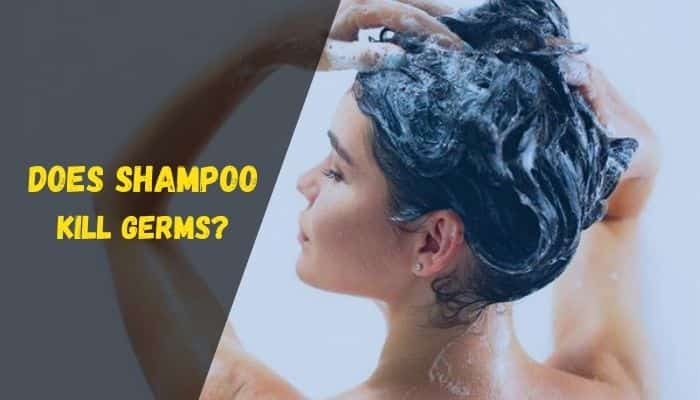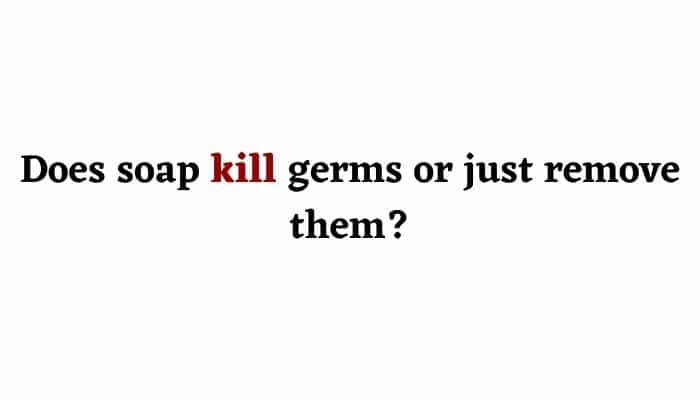I’m Amelia. I have been working with hair care product shampoo and conditioner for 6 long years. This website is...Read more

Would you believe that shampoo can actually kill germs? Well, it turns out that in some cases, it can. Shampoo is a great way to clean your hair and remove dirt, oil, and makeup. But it’s also effective at cleaning the germs that can cause skin infection. So if you have any type of skin infection, be sure to use shampoo to help cleanse your hair and kill the germs responsible for your infection.
Table of Contents
What are the benefits of using shampoo for my hair?
Shampoo is one of the most commonly used products in the world, and for good reason. By removing the built-up oils and dirt from your hair, shampoo helps to restore your hair’s natural shine and moisture. It also helps to remove any residue that may have settled on your hair after styling, making it easier to style your hair.
Shampoo can also be used to remove greasy or oily hair, which can be a problem if you are trying to achieve a clean and fresh appearance. Shampoo can also be used to remove color from your hair, if you are dyeing your hair at home. Finally, shampoo is a great way to remove all traces of scalp odor.
There are a variety of shampoos on the market, so it is important to select the one that is best suited for your hair type and needs. Some shampoos are designed for dry or oily hair, while others are designed for color-treated hair.
Does shampoo kill germs?
There is some debate on this topic, as some people believe that shampooing actually spreads germs and increases the risk of infection. However, the majority of experts and I believe that shampooing does in fact kill germs. This is because shampoo is a soap-like substance that is designed to remove dirt, oil, and other stains from the hair. When the hair is shampooed, the soap dissolves the oils and bacteria on the hair, which then leads to their death.
Can shampoo kill bacteria?
There is some debate over whether shampoo can kill bacteria, but the consensus is that it can reduce the number of bacteria in the hair. Shampoo is a commercial product that is designed to clean the hair and scalp, and it does this by dissolving the oils and grease that contribute to bacterial growth. By doing this, it reduces the number of places where bacteria can multiply.
However, it is important to note that shampoo does not kill all bacteria – it merely reduces the number. In addition, there is a risk of contracting a bacterial infection if the hair is not properly cleaned. So, while shampoo can be beneficial in reducing the number of bacteria on the hair, it is still important to use other forms of hygiene such as hand-washing and rubbing the scalp with a towel before rinsing.
Does soap kill germs or just remove them?

Soap is a popular household item that is used to clean various surfaces. However, some people are wary of the use of soap because they believe that it kills germs. While soap does remove bacteria and other contaminants, the evidence is inconclusive as to whether or not it kills germs. In fact, some studies have shown that soap may actually increase the risk of bacteria becoming resistant to antibiotics. So, while soap does kill germs, it is not always the best solution.
Is shampoo as effective as hand soap?
There are a few arguments in favor of shampoo over hand soap, but the one that seems to hold most water is the fact that shampoo is more effective at removing dirt and oil. This is because shampoo is formulated with surfactants that are able to break down oil and grease. In addition, shampoo also contains chemicals that can kill bacteria and fungus. So, while hand soap may be more affordable, it may not be as effective when it comes to removing dirt and oil.
Which type of shampoo is best for my hair type: clarifying, deep cleansing, etc.?
There are many types of shampoos, but the best one for your hair type will depend on the type of hair you have and how often you plan on using it. For example, if you have curly hair, you will want to use a shampoo that is designed for curly hair. Likewise, if you have frizzy or oily hair, you will want to use a shampoo that is designed for oily or frizzy hair.
There are also shampoos that are specifically designed for color-treated hair, shampoos that are designed for people with sensitive skin, and shampoos that are designed for those with curly or wavy hair. The best way to find the right shampoo for your hair is to try out a few different types and see which one works best for you.
How can I use shampoo to clean my shower and bathtub without leaving a residue behind?
When it comes to cleaning your shower and bathtub, using shampoo can be a hassle. Not only is it difficult to get the soap off the walls and floor, but the residue left behind can be a pain to clean. Fortunately, there are some clever ways to clean your shower and bathtub without using shampoo.
One way is to use a soap scum remover. This product is designed to remove soap scum and other buildup from your shower and bathtub walls and floors. Simply spray the remover onto the surface, wait a few minutes, and then scrub with a brush. You can also use a similar product to clean your shower and bathtub tiles. Simply apply the product to the tiles, wait a few minutes, and scrub with a brush.
Another method is to use baking soda. Baking soda is a natural cleaner that can be used to clean all kinds of surfaces.
Final Words
Shampoo can kill germs! In fact, it’s one of the best ways to keep your hair clean and healthy. By using shampoo, you’re preventing the spread of germs and bacteria, which can lead to infection. So, next time you’re heading to the shower, make sure to use a soap-like product that’s designed to kill germs.
Know more about Does shampoo kill germs

I’m Amelia. I have been working with hair care product shampoo and conditioner for 6 long years. This website is an outlet of my deep passion for hair, Shampoo and Conditioner. Basically, I'm here to guide you on shampoo and conditioner.
